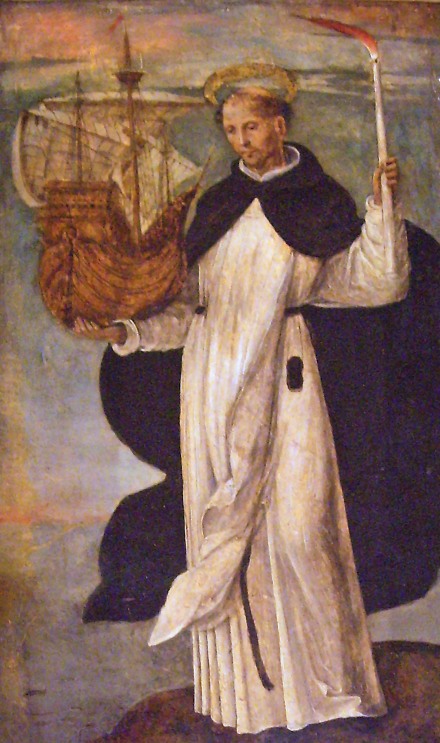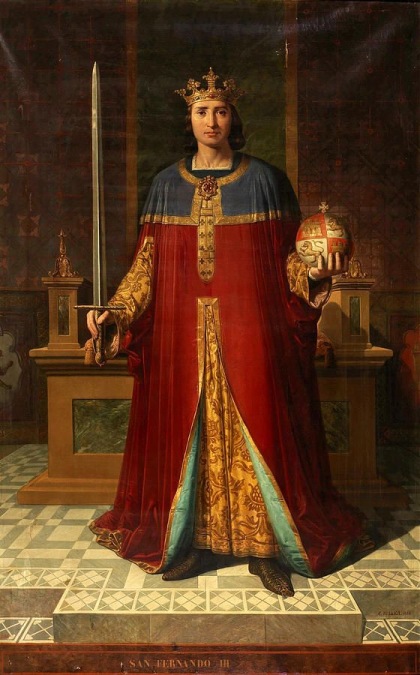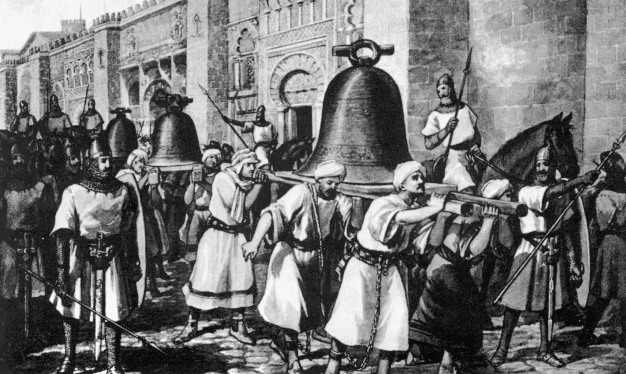Adapted from various sources, including Butler's Lives.
St. Peter Gonzales, Apostle of Spain († 1246 Feast – April 15)
 The best historians place the birth of St. Peter Gonzales in the year 1190 in Astorga, in the Kingdom of León in Spain, where he was descended from an illustrious family.
His wonderful progress in his studies showed him to be endowed with an extraordinary intellect, and he embraced the ecclesiastical state –
though at that time he was a stranger to the spirit of disengagement and humility which ought essentially to accompany it. His uncle, the Bishop of Astorga,
charmed with his capacity, preferred him to a canonry, and shortly thereafter to the deanery of his chapter. The young dean – free indeed from vice but filled with
the spirit of the world – took possession of his dignity with great pomp, but in the midst of his pride, happened, by a misstep of his prancing horse, to fall into a sinkhole.
This was the moment in which God was pleased to strike his heart. This humiliation made the young gentleman enter into himself, and with remorse to condemn his own vanity
and fondness for applause, which deserved a much worse disgrace. Opening his heart to these sentiments of grace, without taking advice from flesh and blood,
he retired to Palencia, to learn the will of God in solitude, fasting and prayer. To fight against pride and self-love he labored strenuously to put off the old man
by mortification and humility, and became quickly a new man in Christ – recollected, penitent, meek and humble.
The best historians place the birth of St. Peter Gonzales in the year 1190 in Astorga, in the Kingdom of León in Spain, where he was descended from an illustrious family.
His wonderful progress in his studies showed him to be endowed with an extraordinary intellect, and he embraced the ecclesiastical state –
though at that time he was a stranger to the spirit of disengagement and humility which ought essentially to accompany it. His uncle, the Bishop of Astorga,
charmed with his capacity, preferred him to a canonry, and shortly thereafter to the deanery of his chapter. The young dean – free indeed from vice but filled with
the spirit of the world – took possession of his dignity with great pomp, but in the midst of his pride, happened, by a misstep of his prancing horse, to fall into a sinkhole.
This was the moment in which God was pleased to strike his heart. This humiliation made the young gentleman enter into himself, and with remorse to condemn his own vanity
and fondness for applause, which deserved a much worse disgrace. Opening his heart to these sentiments of grace, without taking advice from flesh and blood,
he retired to Palencia, to learn the will of God in solitude, fasting and prayer. To fight against pride and self-love he labored strenuously to put off the old man
by mortification and humility, and became quickly a new man in Christ – recollected, penitent, meek and humble.
 The better to secure his victory over the world and himself, he entered the austere Order of St. Dominic. The world pursued him into his retreat.
Its wise men left no stone unturned to make him return to
The better to secure his victory over the world and himself, he entered the austere Order of St. Dominic. The world pursued him into his retreat.
Its wise men left no stone unturned to make him return to his dignity
; but he was guided by better lights and baffled all their suggestions. Having made his vows,
and strengthened his soul in the spirit of humility, penance, and the exercises of holy retirement and obedience, he was ordered by his superiors to employ his talents
in the ministry of the Divine Word – to which he consecrated the remainder of his life, to the great advantage of innumerable souls. After he had passed the best
part of the night in holy meditations, or in singing the praises of God, he spent the whole day in instructing the faithful. His words, always animated by a burning charity,
and supported by example, produced in his hearers the perfect sentiments with which he endeavored to inspire them. The greatest libertines melted into tears at his sermons,
and cast themselves at his feet in a spirit of compunction and penance. The number of conversion wrought by his ministry in the Kingdom of Castilla and León,
especially in the diocese of Palencia, made the King, St. Ferdinand III, though always occupied in his wars with the Moors, desirous to see him; and so much was he taken up
with the man of God, that he wished to have him always near his person, both in the court and in the field. He would have him always be present at his discourses,
whether made to generals, courtiers, or soldiers; and the holy man, by his prayers and exhortations, reformed the corrupt morals both of the troops and the court.
His example gave the greatest weight to his words; for he lived in the court as he would have done in the cloister, with the same austerities,
the same recollection, the same practices of humility and other virtues. Yet some slaves of pleasure hardened themselves against his zeal, and occasioned him many sufferings.
A courtesan was told by some of the nobility, that if she heard Gonzales preach, she would change her life. She impudently answered, If I had the liberty to speak to him
in private, he could no more resist my charms than so many others.
The lords, out of a malicious curiosity, promised her a great sum if she could draw him into sin.
She went to the Saint, and said she wanted to consult with him on a secret affair of importance, in order to be able to speak to him alone. When others were gone out,
she fell on her knees and, shedding forced tears, pretended she desired to change her life. She began to make a sham confession to him of her sins,
but had nothing else in view than to ensnare the servant of God. At last, throwing off all disguise, she said whatever the devil prompted her in order to seduce him.
But her artifices only served to make his triumph more glorious. Stepping into another room where there was a fire, and wrapping himself in his cloak,
he threw himself upon the burning coals, and then called upon her to come and see where he waited for her. She, amazed to see him not burned, cast herself on the ground,
confessing her crimes aloud, and suddenly became a true penitent, as did those who had employed her.
The Saint accompanied the King, St. Ferdinand III, in all his expeditions against the Moors, particularly in the siege and taking of Cordova, in 1236, which,
from the year 718, had ever been the chief seat of the Moorish dominions in Spain. St. Peter Gonzales had a great share in the conquests and temporal advantages of this Prince,
by his prudent counsels and prayers, and by the good order which he prevailed upon the officers and soldiers to observe. The conquest of Cordova opened a new field to the
zeal of our Saint. He moderated the ardor of the conquerors, saved the honor of virgins and the lives of many enemies, and purified the mosques, converting them into churches –
in all of which he was seconded by St. Ferdinand. The great mosque of Cordova, the most famous of all Spain, became the cathedral church; and whereas the Moors,
when they conquered Compostela, two hundred and sixty years before, had carried away the bells and ornaments on the backs of Christians, and placed them in this mosque,
St. Ferdinand compelled the infidels to carry them back themselves in the same manner to Compostela.

St. Peter Gonzales burned with so ardent a desire to preach the great truths of our holy religion to the poor and the peasants, that no entreaties or solicitations
could retain him any longer at court. Galicia and the rest of the coast were the chief theaters of his pious labors, the latter years of his life.
Neither mountains nor places of the most difficult access in Asturia and other parts, nor the ignorance and brutality of the people, could daunt his courage.
Under these fatigues, prayer was his refreshment. He appeared everywhere as a new apostle. But the success of his ministry was the most surprising in the
diocese of Compostela and Tuy, in which he also wrought many miracles. At Bayona in Galicia, the number of his hearers having obliged him to preach in a
great plain in the open fields, and a violent storm rising with wind, thunder and lightning, his whole audience began to feel very uneasy, and thought to
prevent the worst by fleeing. The holy preacher prevailed upon them to stay, and by prayer appeased the tempest. All places around them were deluged,
but not a drop fell upon his audience.
The Saint had a particular zeal to instruct the poor in the countryside, and the sailors whom he sought on their vessels, and among whom he finished his mortal course.
He foretold his death on Palm Sunday, and desiring to die in the arms of his brethren at Compostela, set out from Tuy thither, but growing worse on the road,
returned to the former place on foot; so unwilling was he to remit anything in his penitential life. Luke, the famous Bishop of Tuy, his great admirer and friend,
attended him to his last breath and buried him honorably in his cathedral; and in his last will he gave directions for his own body to be laid near the remains of this servant of God.
They are now exposed for veneration in the same cathedral, in a magnificent silver shrine, and have been honored with many miracles. Some place his death on the 14th,
others on the 15th of April, 1246.
Back to "In this Issue"
Back to Top
Back to Saints
Alphabetical Index; Calendar List of Saints
Contact us: smr@salvemariaregina.info
Visit also: www.marienfried.com


 The best historians place the birth of St. Peter Gonzales in the year 1190 in Astorga, in the Kingdom of León in Spain, where he was descended from an illustrious family.
His wonderful progress in his studies showed him to be endowed with an extraordinary intellect, and he embraced the ecclesiastical state –
though at that time he was a stranger to the spirit of disengagement and humility which ought essentially to accompany it. His uncle, the Bishop of Astorga,
charmed with his capacity, preferred him to a canonry, and shortly thereafter to the deanery of his chapter. The young dean – free indeed from vice but filled with
the spirit of the world – took possession of his dignity with great pomp, but in the midst of his pride, happened, by a misstep of his prancing horse, to fall into a sinkhole.
This was the moment in which God was pleased to strike his heart. This humiliation made the young gentleman enter into himself, and with remorse to condemn his own vanity
and fondness for applause, which deserved a much worse disgrace. Opening his heart to these sentiments of grace, without taking advice from flesh and blood,
he retired to Palencia, to learn the will of God in solitude, fasting and prayer. To fight against pride and self-love he labored strenuously to put off the old man
by mortification and humility, and became quickly a new man in Christ – recollected, penitent, meek and humble.
The best historians place the birth of St. Peter Gonzales in the year 1190 in Astorga, in the Kingdom of León in Spain, where he was descended from an illustrious family.
His wonderful progress in his studies showed him to be endowed with an extraordinary intellect, and he embraced the ecclesiastical state –
though at that time he was a stranger to the spirit of disengagement and humility which ought essentially to accompany it. His uncle, the Bishop of Astorga,
charmed with his capacity, preferred him to a canonry, and shortly thereafter to the deanery of his chapter. The young dean – free indeed from vice but filled with
the spirit of the world – took possession of his dignity with great pomp, but in the midst of his pride, happened, by a misstep of his prancing horse, to fall into a sinkhole.
This was the moment in which God was pleased to strike his heart. This humiliation made the young gentleman enter into himself, and with remorse to condemn his own vanity
and fondness for applause, which deserved a much worse disgrace. Opening his heart to these sentiments of grace, without taking advice from flesh and blood,
he retired to Palencia, to learn the will of God in solitude, fasting and prayer. To fight against pride and self-love he labored strenuously to put off the old man
by mortification and humility, and became quickly a new man in Christ – recollected, penitent, meek and humble. The better to secure his victory over the world and himself, he entered the austere Order of St. Dominic. The world pursued him into his retreat.
Its wise men left no stone unturned to make him return to
The better to secure his victory over the world and himself, he entered the austere Order of St. Dominic. The world pursued him into his retreat.
Its wise men left no stone unturned to make him return to 
